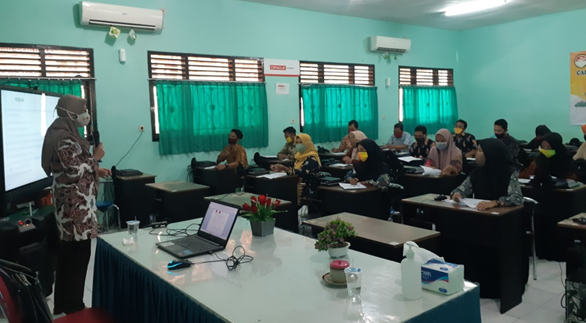Penyusunan Dokumen Mutu Laboratorium Guna Peningkatan Kualitas Pengelolaan Laboratorium di Sekolah Menengah Kejuruan Negeri (SMKN) Preparation of Quality Laboratory Documents to Improve the Quality of Laboratory Management in State Vocational Schools (SMKN)
Main Article Content
Abstract
Vocational High Schools (SMK) in the learning process are supported by laboratories or workshops that provide competence to students. The existence of the Teaching Factory program as a result of cooperation between SMKN and industry is one factor that requires the school to prepare quality documents, competent laboratory managers, and skilled students. Therefore, well-organized Laboratory Management will benefit schools, students, laboratory users, and stakeholders. This activity aims to provide understanding and assistance in compiling laboratory quality documents that adopt the SNI ISO 17025:2017 quality management system. This system regulates testing laboratories and calibration laboratories, but it is very appropriate if adopted in several cases to be applied to educational laboratories, especially the preparation of laboratory quality documents. Community Service activities were conducted at SMKN 4 in Bondowoso Regency and SMKN 8 in Jember Regency. Based on the discussion and questionnaire results, the activity showed that at both SMKNs, the understanding of the laboratory quality management system increased (72.7%) for both students and managers (teachers and technicians/labor). Quality documents for levels 2, 3, and 4 at both SMKNs have been compiled. The number of Standard Operational Procedure (SOP) documents at SMKN 4 is 8 SOPs; at SMKN 8, as many as 31 SOPs are based on SNI ISO 17025:2017 laboratory QMS.
Downloads
Article Details

This work is licensed under a Creative Commons Attribution-ShareAlike 4.0 International License.
Authors who publish with this journal agree to the following terms:
- Any article on the copyright is retained by the author(s).
- Author grant the journal, right of first publication with the work simultaneously licensed under a Creative Commons Attribution License that allows others to share work with acknowledgment of the work authors and initial publications in this journal.
- Authors are able to enter into a separate, additional contractual arrangements for non-exclusive distribution of published articles of work (eg, post-institutional repository) or publish it in a book, with acknowledgment of its initial publication in this journal.
- Authors are permitted and encouraged to post their work online (e.g., in institutional repositories or on their websites) prior to and during the submission process, as can lead to productive exchanges, as well as earlier and greater citation of published work.
- The article and any associated published material is distributed under the Creative Commons Attribution-ShareAlike 4.0 International License
References
Ariyanti, R. (2013). Pengembangan Pengelolaan Laboratorium Berbasis Kompetensi Di SMK Farmasi Putra Bangsa Salatiga. Skripsi. Surakarta: Universitas Muhammadiyah Surakarta.
Badan Pusat Statistik. (2018). Statistik Indoneisa: Statistical Yearbook of Indonesia 2018. Jakarta: Badan Pusat Statistik. https://www.bps.go.id/publication/2018/07/03/5a963c1ea9b0fed6497d0845/statistik-indonesia-2018
Crosby, P. (1997). Quality Is Free. New York: McGraw-Hill.
Gaspersz, V. (2001). ISO 9001:2000 and Continual Quality Improvement. Jakarta: Gramedia Pustaka Utama.
Gustini, N. & Wulandari, W. (2020). Manajemen Laboratorium Sains Untuk Meningkatkan Mutu Pembelajaran. Jurnal Isema : Islamic Educational Management, 5(2), 231–244. https://doi.org/10.15575/isema.v5i2.9308
Ismail, P. (2001). Manajemen Mutu Terpadu. Jakarta: PAU-PPAI Universitas Terbuka.
Kabardaerah. (2020). SMKN 8 Jember Siap Luncurkan Tiga Program Unggulan Di Tahun Ajaran Baru 2020-2021. https://jatim.kabardaerah.com/smkn-8-jember-siap-luncurkan-tiga-program-unggulan-di-tahun-ajaran-baru-2020-2021/
Kertiasa, N. (2006). Laboratorium Sekolah dan Pengelolaannya. Bandung: Pudak Scientific.
Muldayanti, N. & Kurniawan, D. A. (2021). Managemen Laboratorium Sebagai Pendukung Kegiatan Belar Mengajar Ipa Biologi. Widya Laksana, 10(2), 189-196. https://doi.org/10.23887/jwl.v10i2.29895
Mustaqimah, S. (2017). Pengelolaan Perpustakaan Sekolah Berbasis Sistem Manajemen Mutu ISO 9001:2000 Di SMP Negeri 6 Surabaya. Skripsi. Surabaya: Universitas Islam Sunan Ampel Surabaya.
Putra, I., Syakdanur, S., & Makhdalena, M. (2020). Pengaruh Pengetahuan Manajemen Laboratorium Dan Sikap Inovatif Dengan Efektivitas Guru Mengelola Laboratorium IPA SMP/MTs Di Kecamatan Bagan Sinembah Kabupaten Rokan. Jurnal JUMPED (Jurnal Manajemen Pendidikan), 6(1), 47–54. https://doi.org/10.31258/JMP.6.1.P.47-54
Wijaya, E. Y., Sudjimat, D. A., & Nyoto, A. (2016). Transformasi pendidikan abad 21 sebagai tuntutan pengembangan sumber daya manusia di era global. Prosiding SEMNASDIKMAT (Seminar Nasional Pendidikan Matematika), 1(26), 263-278.
